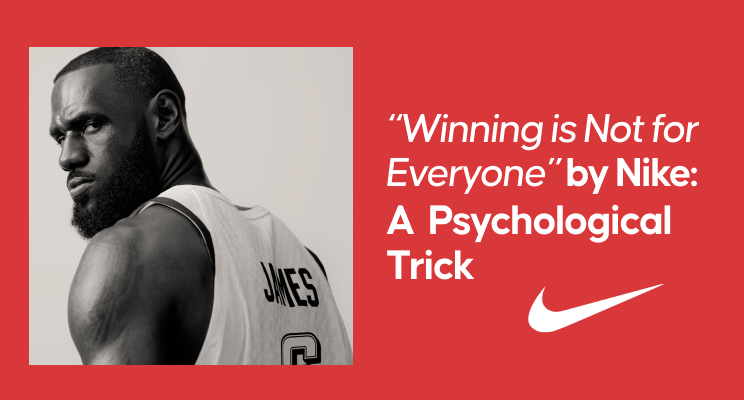
“Winning is Not for Everyone” by Nike: A Psychological Trick
The multinational sportswear Giant Nike has long been admired for its ability to tell gripping stories that captivate customers and audiences. “Winning is Not for Everyone,” a pre-Olympic ad that distinguishes out for its bold use of psychological manipulation, was launched on July 4. With Willem Dafoe’s recognisable voice, this commercial explores the ruthless side of success and forces viewers to face the terrible realities of attaining greatness.
The dramatic undertones of the advertisement are very clear. There is a sense of urgency and excitement created by the graphics, which are a montage of powerful athletic performances. The throbbing, spine-seizing, heart-pounding score of the song intensifies the emotional impact even further.
Dafoe’s narration is what really makes the commercial stand out. Listeners should be captivated and anxious by the terrifying intensity with which he delivers the sentences in a deep, eerie, and unsettling tone.
An Ingenious Psychological Trick that has kept many stunned. The YouTube comments section of the video further underscores the above remarks. Many criticised it; yet accepted that it gives a ruthless message about winning.
With this advertisement, Nike has expertly manipulated the human psyche. By emphasising the drawbacks of achievement, the brand appeals to our natural dread of failing.
The commercial implies that striving for excellence is a challenging path filled with hardships, disappointments, and animosity.
Willem Dafoe’s cackles in the videos and his lines stamp the “I-do-not-give-a-damn” die-hard mentality that embraces the hostility from the opposition. Brands like Monster, Fearless and other high-octane brands could emulate this kind of advertisement.
A sense of urgency is created and viewers are given the impression that they are about to miss something remarkable thanks to this fear-mongering technique.
Furthermore, the exclusivity theme of the advertisement serves to further the idea that success is a privilege that only a chosen few may enjoy. By implying that “winning is not for everyone,” Nike gives its target market a feeling of superiority.
This appeal to exclusivity works very well to increase desire and brand loyalty. Characters like Lebron James, Cristiano Ronaldo and the rest of the sportsmen in the video represent the top percentile of each game they play for.
They tell a story that Nike has amassed the phantom of success and how they represent the hardcore journey of success.
Willem Dafoe: The Voice that turned the tide.

Willem Dafoe is the perfect pick for this advertisement because of his unique voice and commanding on-screen persona as shown in Goblin Spiderman and other villainy movies. The tragic tone of the advertisement is wonderfully complemented by the raw force and authority of his voice.
The audience is drawn in and left intrigued and uneasy by Dafoe’s evil yet alluring voice.
The psychological concepts that underlie the advertisement can also be applied to actual circumstances, such as meetings. For example, to instil a sense of urgency and inspire participants to act, a presenter may employ fear-mongering techniques.
The presenter might increase the persuasiveness and appeal of their message by emphasizing the possible repercussions of inaction.
Moreover, the exclusivity message compiled with stars can make; attendees, customers and critics feel like they belong to an elite group, which would motivate them to participate more fully and contribute valuable insights.
The Nike advertisement “Winning is Not for Everyone” is a brilliant example of manipulating people’s emotions.
The brand has produced a strong message that strikes a deep chord with customers by appealing to our primal needs and fears. Together with Willem Dafoe’s recognisable voice, the ad’s emotional undertones create an experience that will never be forgotten.
Furthermore, this advertisement is a useful tool for comprehending human conduct because the psychological concepts it contains can be applied to a variety of real-world circumstances.
For brands who would, like to explore the nature of human




Leave a Reply